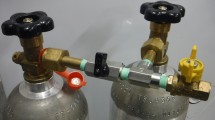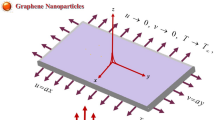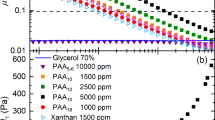Abstract
IT is well known that large molecules can be degraded mechanically, and the rupture of a chemical bond by a high shearing stress under conditions of laminar flow has been demonstrated with a ‘jet viscometer’1. The free radicals formed on degradation by shear give rise to oxidation and other chemical reactions. Evidence of such an initiation of chemical reactions by mechanical forces was found with lubricating oils which had been used in an internal combustion engine while the engine was run ‘cool’ (sump temperature : 69.4° C.). A comparison was made of the change in viscosity and the dependence of viscosity on temperature of the oils when, on one hand, the engine was driven by an electric motor and, on the other hand, run on a fuel the lead content of which was varied. It appeared that the lead content of the fuel promoted a breakdown of large molecules and the combination of free radicals with oxygen molecules, which in their turn formed linkages for the growth of splinter molecules.
This is a preview of subscription content, access via your institution
Access options
Subscribe to this journal
Receive 51 print issues and online access
$199.00 per year
only $3.90 per issue
Buy this article
- Purchase on Springer Link
- Instant access to full article PDF
Prices may be subject to local taxes which are calculated during checkout
Similar content being viewed by others
References
Morris, W. J., and Schnurmann, R., Nature, 160, 674 (1947).
Author information
Authors and Affiliations
Rights and permissions
About this article
Cite this article
SCHNURMANN, R., STRINGER, I. Initiation of Chemical Reactions by Mechanical Forces. Nature 187, 587–588 (1960). https://doi.org/10.1038/187587a0
Issue Date:
DOI: https://doi.org/10.1038/187587a0
Comments
By submitting a comment you agree to abide by our Terms and Community Guidelines. If you find something abusive or that does not comply with our terms or guidelines please flag it as inappropriate.



